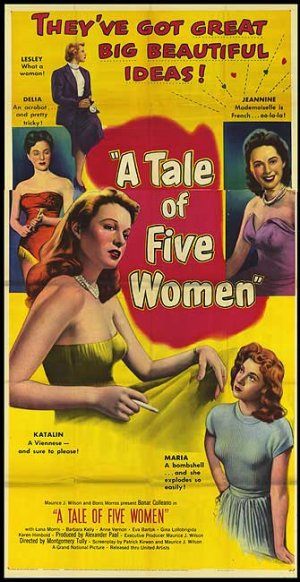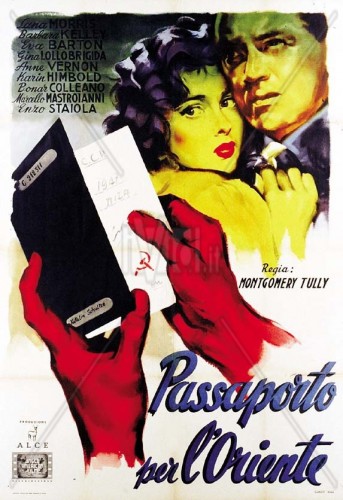By Hanja Dämon

“I’m about to occupy Germany in my own way, in my own time and nobody is going to stop me.” These words are uttered by the principal character in the feature film A Tale of Five Cities, in a scene taking place in winter 1945. He, a British soldier called Robert Mitchell, requests a whole bottle of Scotch but is only allowed one glass. Having just received relieving news in connection with an accident his nephew had, he just snatches the bottle from the barman. After this, the narrative switches back to a scene that happened at the beginning of the film, when the hero is depicted as drunk. Shortly after this incident, he will lose his memory, be mistaken for an American soldier, and be sent on a trip through Europe by an American female journalist in order to regain his identity in exchange for a newspaper story.
The cities the soldier visits are Rome, Vienna, Berlin, Paris and London.
Different directors worked on A Tale of Five Cities, but just one is credited on the VHS Copy the British Film Institute (BFI) provided for my research viewing. The opening credits attribute the direction of this Grand National production entirely to Montgomery Tully, the script is announced to have been the work of two writers, Maurice J. Wilson and Patrick Kirban, when in fact there were different people of diverse nationalities involved both in directing and writing the screenplay, with each working on one of the episodes taking place in the different cities. The full credits available at internet databases such as imdb.com and filmportal.de unveil A Tale of Five Cities as an international co-production, a concept that must be considered a highly unusual approach for a film project starting off in the late 1940s. The film had its premiere in London in 1951 but seems to have been released in West Germany only in 1954. How did it come off the ground? Why does the production period stretch over five years? Do aspects of the production fall within the realm of British film policy in occupied Germany (particularly the Berlin episode)? Coming back to the opening quote one might raise the question whether the portrayal of the British soldier might not have pleased everyone. These are some of the questions I hope further research will answer.

Wolfgang Staudte shot the Berlin episode for which Günther Weisenborn provided the screenplay. It contains a beautiful and relaxed performance of Karin Himbold as Charlotte Smith, who acts as a narrator of the unfolding sequences, by telling Robert Mitchell about life and mentalities currently to be found in Berlin as they stroll through the city’s rubble. A whole range of symbols and metaphors relating to post-war conditions are transmitted both visually and verbally: an old lady clutching a copy of Mein Kampf, a Hitler impersonator surrounded by a small audience that clap hands after his performance and a group of children engaging in a game they call “A Day in the Reichskanzlei”, having previously smashed an NS-sculpture referred to as ‘Hitler’s eagle’ with stones because they believed it was made out of gold. Himbold’s character offers her interpretation of these small events (“The adults mock Hitler because they are ashamed”), hoping that the children despite not knowing anything other than the ruins they play in, will eventually grow up to build “something clean and real, for real, for good people.”
The episodes of the cities are held together by the narrative of the soldier without memory in quest for his identity.
The film has a strong female cast – Gina Lollobrigida, Eva Bartok, Karin Humbold and Anne Vernon and each one of their characters could have been the film’s heroine on her own. Passages spoken in Italian, German and French – not subtitled – reveal side-content relevant to post-war issues and mentality, which it might be interesting to research further.
Alternative titles: Fünf Städte – Fünf Mädchen, A Tale of Five Women.
D: Montgomery Tully, Romolo Marcellini, Géza von Cziffra, Wolfgang Staudte, E.E Reinert, [Irma von Cube]
A: Bonar Colleano, Barbara Kelly, Gina Lollobrigida, Eva Bartok, Karin Himbold, Anne Vernon
Links:
http://www.imdb.com/title/tt0041921/
http://www.filmportal.de/film/5-staedte-5-maedchen_0c5ffabcc58e4fcc8bcc3f4876d41299
